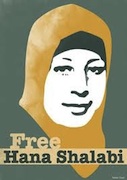
Writing for International Socialist, Aisling Gallagher looks at the hunger strike of Palestinian internee, Hana Shalabi, and recalls the 1981 Irish hunger strike.
As a child, I grew up listening to stories of great Irish heroes. Bobby Sands, Thomas Ashe, Michael Gaughan, Francis Hughes. All names familiar from a young age; familiar for their achievements, for their sacrifice, for the integral belief that what they were fighting for was a cause so justifiable and so right that they would willingly lay down their lives for it. For many people, Hana Shalabi’s name is quickly becoming synonymous with them.
In the H-Blocks of Long Kesh in 1981, the British Government became integrally complicit in the deaths of ten young political prisoners. That great bastion of Western Democracy, led by its first female Prime Minister, stood callously by and watched as ten young men starved themselves to death for a principle. Like Netanyahu today, Thatcher in 1981 held the power to stop what was happening. She had the ability to say no, that the lives of ten young men were worth more than the egotistical stubbornness of the erstwhile British Empire. Instead, she chose, as she proved would always be her preference, to dig in her heels, allowing the Hunger Strikers to die, and in doing so started the process of turning herself into one of the most vilified and polarising figures in British political history. On the day Bobby Sands died, there were protests around the globe in support of the hunger strikers - demonstrators in Milan, Paris, Moscow and beyond burned Union Jacks and the street which housed the British Embassy in Tehran was renamed Bobby Sands Street.
Israel requires no such watershed moment in its quest for detestation. The state is already universally distrusted and despised by most fair-minded people for its deplorable treatment of the Palestinians, its occupation of their land, theft of their water supplies, homes, medicines, electricity and its daily attacks on the people of Gaza - well-recognised as the world’s largest open air prison. However, in the manner of Thatcher in ‘81, and in fact in the manner of all imperialist nations, Israel is about to blunder into one of the the worst tactical decisions of its short existence - and that is saying something.
If Hana al Shalabi is allowed to die, in a similar vein to the reaction to Sands’ death in ‘81, there will be a process of radicalisation amongst an already radical Palestinian youth. Neither Israel nor the eternally corrupt P.A. will have any idea of how to handle the outpouring of anger that will accompany such an event, and the civil unrest that will inevitably follow. Additionally, there will be an international backlash against Israel, the like of which it hasn’t seen since Operation Cast Lead displayed its murderous capability to the world.
Needless to say, this backlash will not be instigated by the Western media - it is doubtful that the BBC and its cohort of neo-liberal news cronies would deign to mention Shalabi even in the event of her death. But as Israel and its allies well know, it is not the established news channels that sway public opinion and turn tides any more. Propaganda can only do so much against the power of social media, and just as Twitter has become the voice of the Arab revolutions, so too has it helped to share the news of Shalabi with the world; Fox, BBC and the Guardian might be scared of upsetting the status quo, but the good people of the Twitter-sphere have no such apprehension. It is of this kind of negative publicity, and this kind of inter-activism, that Israel is scared; it knows that the 21st century has provided outlets for truth on behalf of the Palestinian prisoners that were never available to the representatives of their Irish counterparts thirty-one years ago.
A comrade remarked to me the other day that Hana al Shalabi has the potential to become Palestine’s Bobby Sands. Israel would serve itself well to ensure this does not happen.
* Since this article was written, Shalabi was released by Israel after completing 43 days on hunger strike.
However, more than 1,200 Palestinian prisoners held by Israel have now launched one of the largest hunger strikes on record yesterday to demand a complete end to internment there.
Around 3,500 prisoners refused meals on ‘Prisoners’ Day’ this week and 1,200 stated they would continue with an open-ended hunger strike. The prisoners are protesting against conditions within Israeli jails as well as internment without trial.
![[Irish Republican News]](https://republican-news.org/graphics/title_gifs/rn.gif)
![[Irish Republican News]](https://republican-news.org/graphics/title_gifs/harp.gif)

